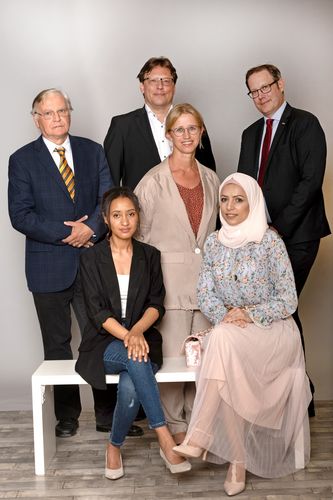Many young people who come to Austria as asylum seekers earnestly wish for good future prospects.

As an active supporter of the MORE program since 2015, the Johannes Kepler University Linz advocates these prospects together with Borealis. Borealis funds the MORE scholarship program which was designed to financially support asylum seekers during their studies. Two scholarship recipients graduated in 2019 and can now celebrate their academic accomplishments.
Social Policy and Welfare (COSOPO) at the JKU. Originally from Syria, Hadil Najjar has been in Austria since 2015 and recently completed her Master's degree in Molecular BioSciences. What do these two have in common? They were both forced to flee their home countries and thanks to the Borealis MORE scholarship program, both of them have completed their academic degrees. They are not alone; since 2017, 49 refugees have received support through the Borealis program.
"While the MORE program and the Borealis scholarship helped me financially, of course, the program also helped me in a psychological way. For this, I am very grateful." said Hadil Najjar. Yeaman Nigatu added: "The scholarship has meant a lot to me. The scholarship not only helps relieve the students' financial burden, but also encourages them to believe in themselves and build a professional career by integrating themselves into higher education in Austria."
Growing the Program
Initially, the MORE program focused mainly on helping refugees learn German. Over time, the program evolved and is now aimed at those who have a refugee background currently studying at the JKU Linz or those who wish to start studying. Those who have a refugee background can actively take part in the MORE program, regardless of whether or not they are seeking asylum or whether or not the procedure has been completed. The program accepts 49 people a year.
Sonja Falkner-Matzinger at the JKU International Welcome Center remarked, "As sustainable social commitment is important at the JKU, the MORE initiative has been instituted at the International Welcome Center. In addition to financial support, we provide individual student counseling for those who have a refugee background as it is an essential part of pursuing an academic degree. Students enrolled in a program also have an opportunity to become better acquainted with Austrian culture and the lifestyle, become more involved and become integrated."
Education is Key to Successful IntegrationThe Borealis MORE “Einstiegstipendium” provides financial support to 24 degree-seeking students who have a refugee background to help them start their studies. While the most popular program is the Bachelor’s degree program in Computer Science (5 students), scholarship recipients are also studying chemistry, social economy, economics, or medicine. Approximately 70% of the scholarship recipients are male and 30% are women. The most common countries of origin include Afghanistan, followed by Iran and Ethiopia.
The Borealis MORE scholarship is a subsidiary scholarship, closing the gap for students who have a refugee background when they are excluded from receiving other financial aid. The amount of aid varies between € 110 and € 300 per month, depending on asylum status. In addition to financial aid, personal counseling is provided in order to access to university education. Scholarship recipients must provide proof of successfully completing 24 ECTS credits a year.
Thomas Gangl, CEO of Borealis, stated "Diversity, a passion to conduct research, integration, and education are deeply rooted in Borealis’ DNA. We need smart minds in our team – people who drive innovation and find solutions in support of new plastics in order to move our current linear economic system towards a circular economy, step-by-step. We feel it is vital to support students who study and who also have other challenges to overcome."








